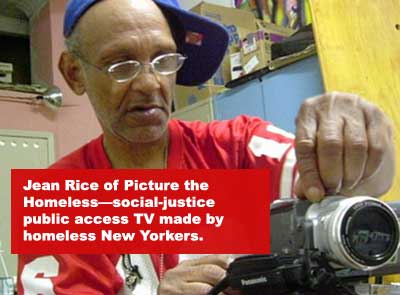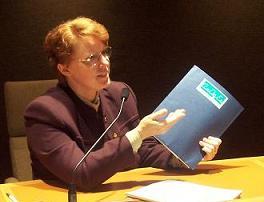Verizon likely to push for NYS video franchise.
Primary tabs
With Verizon’s push for national video franchising stalled in Washington—the telephone giant will likely push for statewide franchises in New York State, Pennsylvania, and Massachusetts. Changes in the franchising system could impact public access TV—and strip the public of this valuable democratic and social-justice media forum. NYS public access TV advocates—and the media justice community—must rally to oppose changes.


From a small office off the Bronx’s
Fordham Road, an organization founded and led by homeless New Yorkers
runs a small media empire. Well actually, “empire†is a bit of an
exaggeration. But the members of Picture the Homeless do regularly
create and air their own TV shows on Time Warner and RCN cable in
Manhattan—and by doing so reach 650,000 homes in one of the largest and
most lucrative media arenas in the world. To do this, the group doesn’t
pay a penny—as the video equipment and channel-time they use is free.
Picture
the Homeless is one among the hundreds of community organizations
around the state using public access TV channels to inject the public
discourse with local perspectives on pressing issues of the day. With
the corporate media habitually failing to make credible local
programming, public access TV offers audiences genuinely local TV
content.
But public access TV is under threat—for months a phone
company backed end to local video franchising has been debated in
Washington. Local franchises are the mechanism that provides funding
and channel space for public access TV—now the pressure is on to
replace these local franchises with one national franchise.
With changes in franchise rules stalled
in Washington, Verizon is likely to soon push for statewide franchises
in the profitable eastern states. Statewide franchises could be equally
(or more) damaging to public access TV than the proposed federal
legislation. Top Verizon lobbyist Tom Tauke says, the company will “focus on obtaining statewide agreements in Massachusetts, New York, and Pennsylvania†(Bloomberg News—Oct 5th, 2006) if there is no movement in Washington.
There
are believed to be roughly 100 public, educational and governmental
(PEG) TV stations in New York—stations such as Rochester Community TV,
Schenectady’s SACC-TV, and stations in each of New York City’s five
boroughs. These centers are natural rallying-points for organizing
popular opposition to legislative changes. In June, Penfield Community
TV in Munroe County hosted the first statewide meeting of the recently
formed NY chapter of the Alliance For Community Media—thereby
jumpstarting coalition building among the state’s access TV centers.
But there is a lot of work still to be done in organizing the access
community—some local centers are not members of the Alliance For
Community Media, and others are so under-resourced they may not be able
to take on advocacy efforts.
Public access TV is an important
venue for addressing social-justice issues—and for community building
and empowerment through the provision of media communication tools to
marginal or disempowered communities. “Without public access TV we
wouldn’t be able to bring the issues our organization faces to the
public’s attentionâ€, says Rice of Picture the Homeless. He adds,
because of public access TV the organization has been able to focus
public scrutiny on the deplorable conditions inside the NYC’s homeless
Emergency Assistance Unit and to counter the NYPD’s illegal
fingerprinting of homeless New Yorkers.
It’s important
social-justice and alternative-media advocates rally in support of
public access TV. And ensure that Albany—or Washington—does not
dismantle it. Advocates should look seriously at expanding public
access TV into eligible communities around the state—communities where
it has never been introduced. With cable TV morphing into digital
broadband service (alongside data and voice communication), the future
for public access TV, community Internet, Internet radio, and other
democratically accessible on-line media forms is intertwined.
In
May, NY State Assemblyman Richard Brodsky introduced a statewide video
franchising bill. Although there has been no movement on Brodsky’s
Assembly bill 11529—damaging statewide franchises have been adopted in
California, Texas, New Jersey, Virginia and Indiana. In Michigan,
statewide franchising was stopped when state legislators received
hundreds of letters from municipal leaders and the public; and in
Pennsylvania a vote on the statewide “Cable Choice and Competition Actâ€
has been averted—largely because of municipal opposition and the bill’s
failure to provide service “build-out†in rural communities.
Lyell Davies
Saveaccess.org









